Bioinformatics is a modern and dynamic field that integrates biology, informatics, and mathematics. It not only opens opportunities to work with large biological data but also provides tools to develop new drugs, vaccines, and contribute to the global progress of biotechnology. In Lithuania, bioinformatics studies are highly valued, as they not only prepare students to work in various industries but also open doors to scientific careers. From next academic year, this study programme will be offered in English, and first-year students will have the option to study some subjects in Lithuanian.

MIF students. Photo by Justinas Auškelis.
Exceptional knowledge and its broad application
At the Faculty of Mathematics and Informatics of Vilnius University (VU MIF), bioinformatics studies provide students with a broad knowledge base. They analyze biological processes, create computational models, and apply IT solutions for processing biological data. During their studies, students gain knowledge in gene therapy, treatment of dangerous diseases, protein structure prediction, and many other important areas that directly contribute to the development of biomedicine and biotechnology.
As stated by the chairman of the VU MIF bioinformatics Study Committee, associate professor dr. Gintautas Bareikis, bioinformatics is the future that is already coming into our daily lives. "For those who want to work with large data, create computational models for biological processes, and contribute to scientific progress, bioinformatics is an excellent choice," he says.

Gintautas Bareikis. Photo by Justinas Auškelis.
Studies opened the door to the world of science
One example of success from this program is dr. Andrius Merkys, a senior researcher at the Institute of Biotechnology of the Life Sciences Center of Vilnius University. Andrius began working in his second year and quickly realized that a career in science was what he wanted to do. His work includes not only research and writing articles, but also teaching students. Bioinformatics studies provide a unique combination of skills and knowledge, allowing one to work with both biological data and IT solutions. Working in this field allows people to contribute to scientific breakthroughs and solve real-world problems. "These studies offer great opportunities," says A. Merkys without hesitation.

Andrius Merkys. Photo by Ugnius Bagdonavičius.
Andrius is also involved in the development and improvement of the Crystallography Open Database (COD). What is it? The COD is a creation of the global community, and anyone can contribute and use its data. The database has a search function with many parameters, but users can also download all the records from the COD and perform searches and reviews on their own computers or use special software tools for working with crystallographic data. The main areas of data use are materials science and drug discovery. A. Merkys began working on this impressive project while still studying.
Choosing Studies – a time-consuming process
Another inspiring example is the story of Ieva Pudžiuvelytė. The girl from Mažeikiai graduated Magna Cum Laude in Bioinformatics. Ieva was not only an excellent student, but also, from the first year, with the guidance of Professor G. Bareikis, got involved in active scientific and community activities. She decided to study bioinformatics after much self-reflection and realizing that this field beautifully merges different areas that she was interested in: mathematics, IT and life sciences. Her participation in the VU "Young Mathematicians' School" influenced this decision: "I realized that the tasks in the 'Young Mathematicians' School' made me see mathematics from a different angle and even fall in love with it," says I. Pudžiuvelytė. She is happy that the studies not only met her expectations, but also gave her the opportunity to contribute to solutions that can bring real benefits to biomedicine.

Ieva Pudžiuvelytė. Photo from personal archive.
For those considering bioinformatics studies, Ieva advises that students in this program are primarily prepared to engage in scientific work: analyzing scientific literature, formulating hypotheses, performing necessary analyses in biological sciences, and creating software tools. She recommends bioinformatics studies to those who want to apply their skills in mathematics and programming while contributing to the progress of biomedicine or life sciences.
Career opportunities and future perspectives
The field of bioinformatics is expanding rapidly not only in Lithuania, but worldwide. More and more biotechnology and biomedicine companies are looking for qualified professionals with expertise in both informatics and biology. Graduates of this program can work in IT and data analysis companies, research institutions, pharmaceutical and biotechnology companies, as well as healthcare institutions and medical centers.
Bioinformatics studies provide an opportunity not only to gain valuable knowledge, but also to contribute to the progress of life sciences. The experiences of graduates of this program show how these studies can open doors to successful careers both in Lithuania and worldwide.
